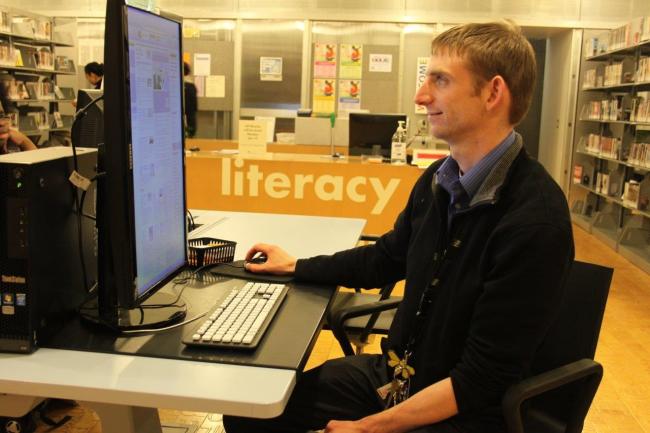SPD discusses potential research project with Burien hacker
Tim Clemans, formerly known as “Anonymous” or @PoliceVideo, may soon reach a deal with SPD to
lead a research project that tests new redactions techniques for police reports and footage.
Mon, 01/19/2015
By Tim Clifford
On Jan. 16 the Seattle Police Department held a closed door meeting at 3:30 p.m. with Burien programmer Tim Clemans, the most aggressive records requestor in the department’s history, to discuss a possible research project for Clemans to develop software for SPD that would automate redactions in police reports, dash cam videos, and footage from body-worn video cameras.
“The law was never designed for the potential that terabytes of data would be automatically released to the public, and this is a real problem now,” said Clemans.
Transparency has been a key issue for the department with the oncoming implementation of body-worn video cameras and the endless hours of footage that will need to be readied for public release.
“Basically the goal is to develop software code that’s automating the release of police reports, in particular, then there’s also stuff with video that they want to do,” said Clemans.
Essentially the idea would be to allow Clemans to test redacting software on fake police reports with tech specialists within the department assessing the results. After a certain testing period the software would slowly be implemented on “low risk” category reports (those deemed to have minimal sensitive information) and eventually worked through to higher risk police reports.
“They were really kind of skeptical at first but now they are starting to think “let’s test it and if it passes the test we’ll take it seriously”. And, so the research agreement allows me to have access to un-redacted reports to test my software against,” Clemans explained of this possible agreement.
The protection of privacy is a priority to Cleman’s research as well. With data from body-worn video cameras and dash cams soon providing a virtual map to an officer’s “beat” and possibly the locations of safe houses for victims of violent crimes the department has much to prepare for.
“They are really worried about releasing data that could get someone killed,” said Clemans.
In an email following the meeting from Assistant City Attorney Mary Perry to Clemans the steps moving forward are outlined as:
1.) Follow up with Mark Knutson on generating “test” GOs from RMS to use to determine accuracy of your redaction script
2.) Contact Mike Wagers [Chief Operating Officer for to start process for research agreement for access to allow access to data to use for testing redaction script you have generated, to explore methods for greater pro-active disclosure of information to public, and to generate analytics on SPD data.
“Everything that we are doing is focused on how we can be more transparent and more efficient as a government agency while still balancing people’s privacy interests and following the law as our guiding posts,” explained Public Information Officer Sergeant Sean Whitcomb.
“We did discuss the possibility of a research agreement, but it’s still early, it’s in the early stages, but we are still discussing it. We are looking at it now and we are working towards it” continued Whitcomb of the talks with Clemans.
These talks come following the first ever Seattle Police Department Hackathon that was held Dec.19, in which local computer programmers were asked to present new ideas for faster redaction techniques of videos and police reports. The Hackathon itself was born from an outsized public disclosure request filed by Clemans (at that time only known as “Anonymous”) for all videos in the department’s databanks. The event was held the day before tests in the East precinct were set to begin with SPD patrol officers wearing body-worn video cameras, a new system which will also bring about its own complications in terms of transparency and public records.
According to Clemans two other presenters from the Hackathon, Henry Kroll and Simon Winder, have also been contacted by SPD following positive reception from the department for their presentations. Talks with these programmers are yet to be scheduled.


